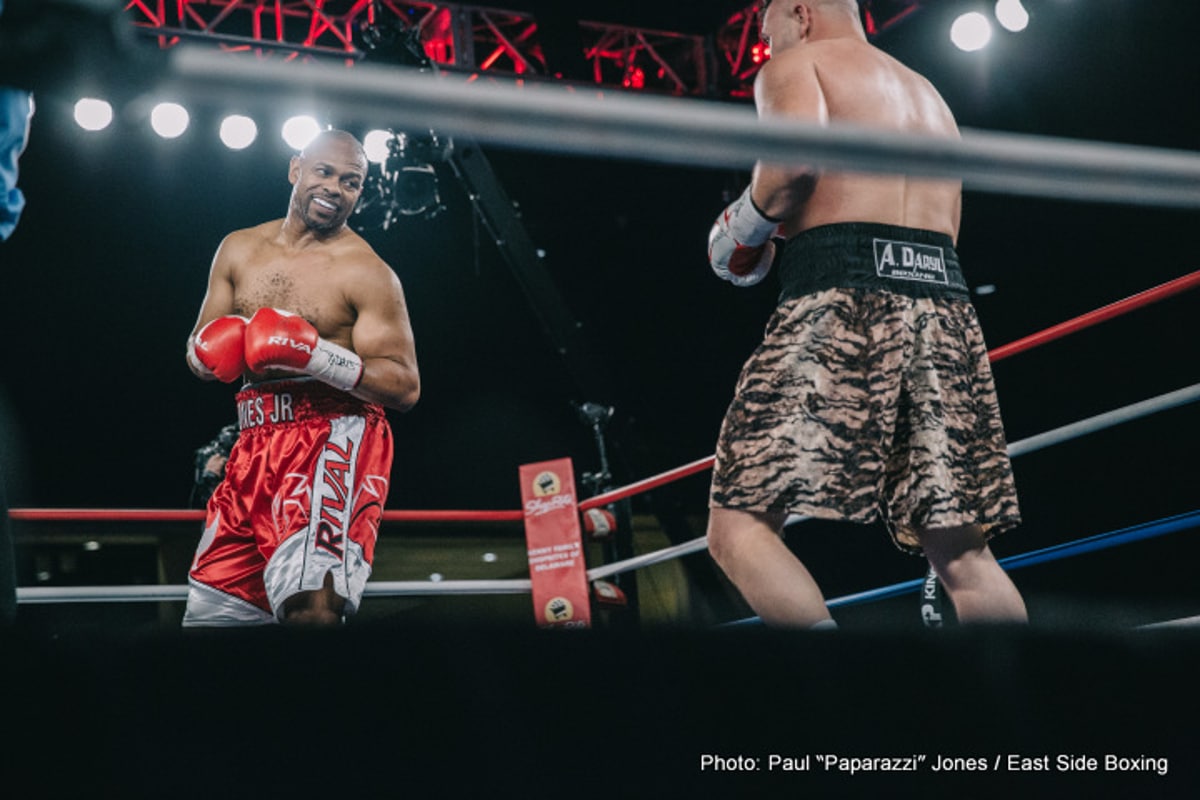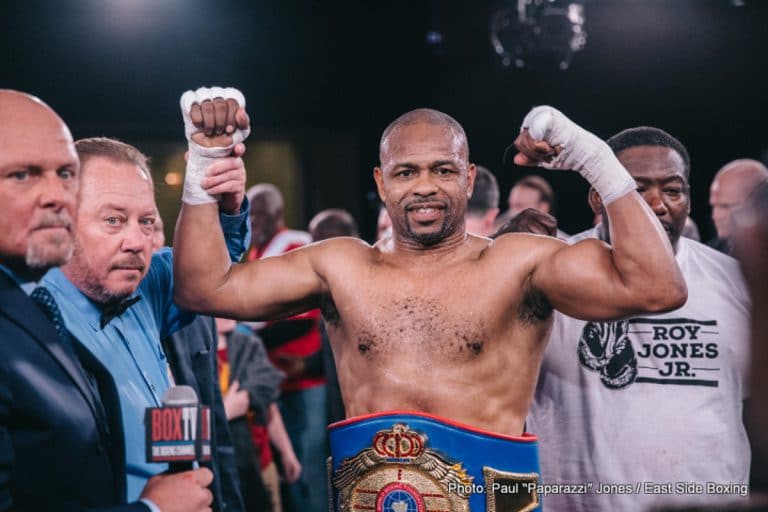By Tony McKenna: At his best, Roy Jones Jr was a virtuoso. He brought to the ring a smoothness, a sinuousness that was almost hypnotic. Sometimes one could forget that Jones was fighting at all, for the performances he produced were closer to theatre or ballet. And yet. Suddenly he would land a fusillade of punches; blows which arrived from everywhere and nowhere; a flurry which made it seem as though his opponent was suspended in slow motion. Until they went crashing to the ground, that is.
At his best, Roy Jones was boxing inside a vacuum; every punch was deft, every combination fluid and every movement exact. He was boxing in a place that no one else could reach, and his achievement in the sport would reflect that. He is the first boxer to have started his professional career at light middleweight and go on to win a heavyweight title in 106 years. He defeated the WBA heavyweight champion John Ruiz in 2003.
But after his sudden drop from heavyweight to light-heavyweight following that victory, Roy Jones incurred some dismal results. He was twice defeated by Antonio Tarver. Later still, Jones looked lackluster when facing a vibrant Calzaghe who pepper-punched him for the best part of twelve rounds before winning on points. He looked exhausted and bereft of hope in his confrontation with determined journeyman Glen Johnson, a fight in which Jones remained constantly on the back-foot, shuffling away from his opponent until an inevitable right hook put him out of his misery.
I still remember the Johnson fight. Seeing Roy Jones Jr knocked down was always something which felt unnatural, like seeing an iceberg floating across the warm waters of the Hawaii coastline, but seeing him laid out the way he was in the Johnson fight – unconscious for several minutes – was simply frightening. One felt that perhaps the greatest practitioner of boxing of the age might also become its most tragic victim. Thankfully Jones got to his feet once more, but he went on fighting far beyond his peak, taking risks that he should never have taken perhaps because his art was so sublime that the thought of not practicing it was inconceivable to him, even as his aging body began to let him down.
But for some, the litany of defeats Jones suffered – weight-drained and aging – was the surest confirmation that he had never been truly great in the first place. In reality, however, such defeats should never be allowed to detract from a fighter’s greatness.
Or anyone else’s, for that matter. To take the field of science. In the later part of his life, Albert Einstein developed ideas about physics that were widely discredited, but these, of course, didn’t detract from his status as the great theorist of relativity.
And in boxing’s own history, we recall all too clearly how titans of the sport, such as Muhammad Ali, would fight on, well past their peak, often receiving bloody beatings, much to the chagrin of the faithful. And yet, Ali’s epithet will perhaps always read as the ‘Greatest of All time.’ So too should we judge Jones – from the contribution he made to boxing history in his prime.
The other argument which is leveled against Jones’ legacy is that he fought in an epoch where the competition was not so great. And yet, when we examine prime Jones’ resume, it is littered with top-class fighters, including James Toney, Bernard Hopkins, Thulani Malinga, Virgil Hill, and Mike McCullum. Both Hill and McCallum were past their best when they fought Jones, but that certainly wasn’t true of the undefeated Toney, Bernard Hopkins, or the other notables to boot.

And yet, the implication lingers. The suggestion that the boxing stratum of the 90s, which Jones Jr dominated, was less than a golden era for the sport, especially when one refers to the decade before and the intense confrontations between fighters like Leonard, Hearnes, Hagler, and Duran.
But though Jones learned a great deal from those fighters (Leonard in particular), he purified and concentrated their skills to the point of eclipse. And this, in a sense, holds the key to the commonly recycled notion that Jones was fighting in a relatively unremarkable division.
In the classic film, ‘It’s a Wonderful Life’ – James Stewart gets to see what the world would have been like if he’d never been around. How that alternative reality would have played out had he never been born. When it comes to an assessment of Roy Jones Jr, we boxing fans should try to do the same. We should ask ourselves: What would the 90s middleweight and super-middleweight division have looked like if Roy Jones Jr had never been born?
And let me tell you – that place looks completely different. In that place, the legends James Toney and Bernard Hopkins have two great confrontations. Hopkins, sly and slick, outpoints Toney in the first, but Toney gets his revenge in the second when he hurts Hopkins in the 9th and though the fight goes to points, Toney – with his explosive power and sublime shoulder rolls – does enough to ultimately secure the victory. Both these fighters go down in history as the greatest of their generation; their rivalry as intense and compelling as Ali vs. Frazier or Hagler vs. Hearns.
But there are other epic grapples too. In this alternate timeline, an undefeated number one contender named Montell Griffin – who is one of the most deft and subtle counterpunches ever to grace the sweet science – comes up hard against the steel wall of a fighter who had never been knocked out and had dynamite in his fists, an indomitable warrior named Merqui Soza. Soza becomes the Duran to Griffin’s Leonard, and they have several confrontations which result in defeats on both sides, though Griffin is remembered, in retrospect, as the greater.

Two British fighters named Ben and Eubank, relatively unknown in America, inflict shock defeats on Soza by points though they are, in turn, defeated by Griffin and Toney, respectively. And this then creates the basis for a super-fight between Montell Griffin and James Toney, which eventually yields a decision in Griffin’s favor (Who could…ahem…ever imagine that happening in reality?)
In other words, if Roy Jones hadn’t been around, then the division itself would have shaped up into a much more complex and competitive place. In his prime, Jones was simply head and shoulders above the rest. It was not the case that a lackluster division made Jones look great, but rather the greatness of Jones, which caused the division to appear lackluster. Jones curtailed the careers of fighters who otherwise would have been far more vividly remembered – who would have very possibly counted as the greatest in their own right – had they not met Jones at his peak.
The final argument those who dismiss Jones use is to suggest that his talent was purely physical, wholly rooted in a natural ability that would deteriorate as soon as his reflexes and power began to wane with age. It’s true, of course, that every great fighter is eventually overwhelmed by that most inscrutable and pitiless appointment – Father Time. But to argue that Jones relied only on his fast hands (Amir Khan was perhaps faster) or that he depended entirely on his great reflexes to get him out of trouble (Naseem Hamed probably had better) – seems to me to disregard the way in which, Roy, in his prime, could adapt to and neutralize each and every boxing style he was confronted with.
When I think about Roy’s boxing stratagems, what comes to me is not the specter of physical violence but rather the more placid arena of the chessboard. In the late 80s and early 90s, two chess greats played out matches against the IBM super-computer nicknamed ‘Deep Blue.’ The computer defeated them. In retrospect, both of these grandmasters agreed that the experience of playing against the unstoppable computer, with all its millions of calculations per second, was like having ‘a wall coming at you.’[1]
That, to me, seems to sum up the experience of fighting a prime Roy Jones. The sheer claustrophobia of it. Every action you take is at once nullified and neutralized by a boxing brain that is so finely tuned as to counter the moves of opponents even before they have made them. Consider the famous sequence in the fight with James Toney, where Jones feigns, and Tony responds, only Roy has executed his counter almost instantaneously so as to catch Tony clean, sending him staggering to the ground. Or the devastating KO of Glen Kelly, where Jones rests his hands behind his back, swaying to and fro before a flashing right drops his opponent cold.
Of course, the capacity to outmaneuver an opponent so entirely is not the product of an innate ‘natural ability’ but rather the result of a highly developed boxing mind which was tuned over time and through practice. Certainly, Roy’s ‘natural’ abilities – his speed and lightning-like reflexes helped facilitate his victories – but he combined those abilities in a fluid, and at times poetic style which drew upon and superseded the methods of previous boxing greats. Roy Jones was a fighter who learned; he wasn’t simply born.
This was expressed in his capacity to adapt his style in accordance with the fighter he was facing. With a bruiser like Soza or Malinga, Jones would draw them in, deflect or dodge their offense, and then belittle them with a barrage of counter-punches, short, intimate, close up. He was capable of playing the long game too, of resting on his laurels, of floating enticingly just out of reach and thereby exhausting his opponents, before inflicting a few telling jabs and winning the fight on points, without ever truly turning up the heat.
Jones could intuit, feel out, his opponent perhaps better than any fighter I have ever seen and tailor his fight plan thereby. In fact, the only time I ever remember seeing a prime Roy Jones somewhat wrong-footed was in his first fight against Montell Griffin. It would be too much to say that Jones was actively losing the fight before the eventual disqualification, but certainly, there was something about Griffin which Jones hadn’t managed to get a handle on and which caused a rupture in his otherwise flawless and sweeping dominance.
Nevertheless, Jones learned from this, and when the time came for a rematch, he had recalibrated in order to deliver to his opponent a somewhat different response. He knocked Griffin out in the first round. It was masterful! More than that, it was genius. And that’s how Roy Jones Jr should be remembered.
[1] Cited in Barrat, James (2013). Our Final Invention (Kindle ed.). St. Martin’s Press. ISBN 978-0-312-62237-4.
